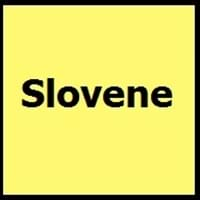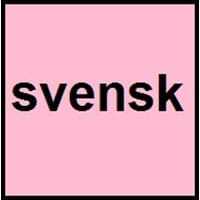Slovene vs Swedish
Countries
European Union, Slovenia
European Union, Finland, Nordic Council, Sweden
National Language
Austria, Croatia, Hungary, Italy, Slovenia
Sweden
Second Language
Not spoken in any of the countries
Finland
Speaking Continents
Europe
Antartica, Europe
Minority Language
Austria, Hungary, Italy
Australia, Belgium, Canada, France, Germany, Netherlands, Spain, Switzerland, United Kingdom, United States of America
Regulated By
Slovenian Academy of Sciences and Arts
Institute for the Languages of Finland, Swedish Academy, Swedish Language Council
Interesting Facts
- The Freising Monuments is the oldest preserved records of written Slovene from 10th century.
- The first Slovene book was printed in 1550.
- In Swedish language, article comes after noun.
- Most of the words in Swedish language began "S" than any other letter.
Similar To
Serbo-Croatian
Norwegian and Danish Language
Derived From
Not Available
Old Norse Language
Alphabets in
Slovene-Alphabets.jpg#200
Swedish-Aphabets.jpg#200
Writing Direction
Left-To-Right, Horizontal
Left-To-Right, Horizontal
Thank You
Hvala
tacka dig
How Are You?
Kako se imate?
hur mår du
Good Night
Lahko noč
godnatt
Good Evening
Dober večer
god kväll
Good Afternoon
Dober dan
god eftermiddag
Good Morning
Dobro jutro
god morgon
I Love You
Ljubim te
jag älskar dig
Excuse Me
Oprostite
ursäkta mig
Dialect 1
Prekmurje Slovene
Dialects
Where They Speak
Hungary, Slovenia
Gabon
Dialect 2
Resian
Dialects
Where They Speak
Italy
Georgia
How Many People Speak
Not Available
Dialect 3
Styrian
Dialects
Where They Speak
Slovenia
France
How Many People Speak
Not Available
Speaking Population
Not Available
Second Language Speakers
Not Available
Native Name
Not available
Svenska
Alternative Names
Slovenian, Slovenscina
Ruotsi, Svenska
French Name
slovène
suédois
German Name
Slowenisch
Schwedisch
Pronunciation
[slɔˈʋèːnski ˈjɛ̀ːzik], [slɔˈʋèːnʃt͡ʃina]
[ˈsvɛ̂nskâ]
Ethnicity
Slovenes
Swedes, Finland Swedes
Origin
972-1093
13th Century
Language Family
Indo-European Family
Indo-European Family
Subgroup
Not Available
Germanic
Branch
Not Available
Northern (Scandinavian)
Early Forms
No early forms
Old Swedish
Standard Forms
Slovene
Standard Swedish
Language Position
Not Available
Signed Forms
Not Available
Tecknad svenska, ("Signed Swedish")
Scope
Individual
Individual
ISO 639 6
Not Available
Not Available
Glottocode
slov1268
swed1254
Linguasphere
53-AAA-f
52-AAA-ck to -cw
Language Type
Living
Living
Language Linguistic Typology
Not Available
Subject-Verb-Object
Language Morphological Typology
Fusional
Not Available
Slovene and Swedish Language History
Comparison of Slovene vs Swedish language history gives us differences between origin of Slovene and Swedish language. History of Slovene language states that this language originated in 972-1093 whereas history of Swedish language states that this language originated in 13th Century. Family of the language also forms a part of history of that language. More on language families of these languages can be found out on Slovene and Swedish Language History.
Slovene and Swedish Greetings
People around the world use different languages to interact with each other. Even if we cannot communicate fluently in any language, it will always be beneficial to know about some of the common greetings or phrases from that language. This is where Slovene and Swedish greetings helps you to understand basic phrases in Slovene and Swedish language. Slovene word for "Hello" is Halo or Swedish word for "Thank You" is tacka dig. Find more of such common Slovene Greetings and Swedish Greetings. These greetings will help you to be more confident when conversing with natives that speak these languages.
Slovene vs Swedish Difficulty
The Slovene vs Swedish difficulty level basically depends on the number of Slovene Alphabets and Swedish Alphabets. Also the number of vowels and consonants in the language plays an important role in deciding the difficulty level of that language. The important points to be considered when we compare Slovene and Swedish are the origin, speaking countries, language family, different greetings, speaking population of these languages. Want to know in Slovene and Swedish, which language is harder to learn? Time required to learn Slovene is 44 weeks while to learn Swedish time required is 24 weeks.





